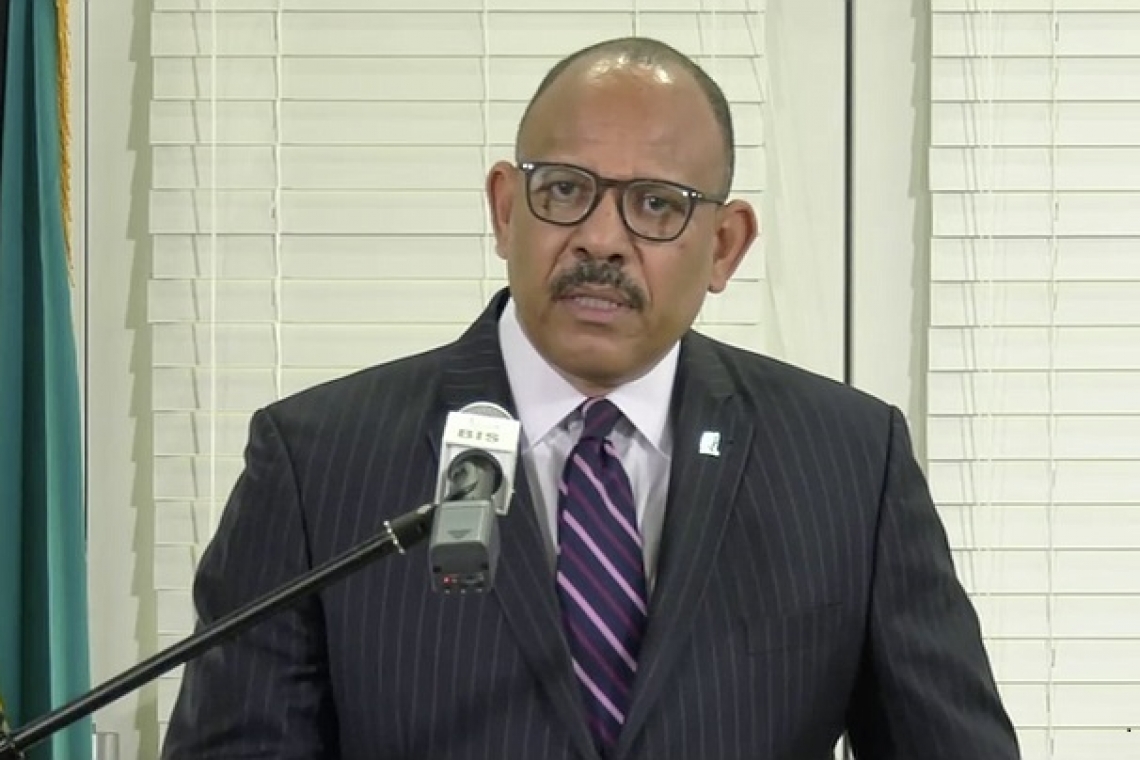NASSAU, Bahamas--Expanded coronavirus COVID-19 testing will begin this weekend on high-risk populations, as the number of confirmed cases increased by one to 54 on Thursday, April 16, and another death from the disease was recorded.
The expanded testing will include contacts of active cases, nursing homes, and the prison and health care workers.
As health officials finally move on expanding testing as many have called for, Health Minister Dr. Duane Sands said lockdown restrictions in Family Islands with no reported cases could be relaxed soon.
The newest confirmed case is a 93-year-old woman from New Providence with no history of travel. She is in the hospital. The latest deceased case, the ninth person to die from COVID-19, is case 31, a 50-year-old New Providence man with no history of travel.
All of the deaths were from the category of the most vulnerable, ranging from ages 50 to 91, Dr. Sands said. Five were men and the remaining victims were women.
Seven of the nine cases had comorbidities or underlying illnesses; four or 44.4 per cent of the cases were obese; three out of nine or 33.3 per cent suffered from hypertension; two experienced asthma; and one out of nine, or 11.1 per cent, suffered from either sleep apnoea, high lipids in the blood, renal failure or diabetes.
Nine of the positive cases are healthcare workers. Up to press time on Friday, 895 people were in quarantine.
“My fellow Bahamians, it is a fact that as of April 16, our COVID-19 confirmed deaths are 6.4 times more likely to have comorbidities or underlying conditions,” Dr. Sands said on Thursday, April 16. “Our surveillance team will continually pursue contact tracing for persons who were exposed to the COVID-19 cases.
“We have identified 892 contacts through our contact-tracing system. It has been proven that a country’s ability to appropriately monitor, evaluate and implement policies and clinically support its citizenry are keys to containing an outbreak of COVID-19.
“One of the linchpins of evaluation of COVID-19 is laboratory testing. The World Health Organization and other leading health institutions support enhanced testing capabilities.
“Consequently, the Ministry of Health is planning our testing expansion for COVID-19 in at-risk populations such as contacts of active cases, nursing homes, the prison and with health care workers. Expanded testing is critical for us to have an increased understanding of the pandemic in the Bahamas so we can plan and prepare to protect these vulnerable populations.
“To determine our COVID-19 positive cases and to gauge community spread, it is important to have a sustained testing mechanism.”
He also said: “We believe that each of these groups are separate and we have the capacity to test all of them simultaneously. So we will target health care workers. We will target persons in assisted living homes. We will target those persons in the prison with a goal of expanding the total number of persons tested on a daily basis over time and ultimately we will get to a point where we believe we will have an even more representative sample of what is going on in our communities.”
The government is exploring the incorporation of rapid testing. As it stands, the gold standard of testing and most reliable test is the genetic/molecular test, or real time polymerase chain reaction (RT-PCR) test, Dr. Sands said.
Officials, however, say rapid tests have a reputation to inaccurately give results.
Dr. Sands said an in-country validation will take place to ensure the 10,000 rapid kits now here meet the standard. If they do, they will be used. He said there are 7,000 RT-PCR tests also.
For her part, health consultant to the office of the Prime Minister Dr. Merceline Dahl-Regis said the Easter holiday weekend proved successful and allowed the country to avoid about 26 new cases. But she also noted that following the weekend lockdown, the streets are flooded with people who do not practise social distancing. It could have a negative impact on the progress made, she suggested.
She pinpointed several models produced by local health experts that showed the marked progress. She stressed that it was critical for people to maintain social distancing and avoid gatherings to see continued curve flattening.
“You see the effect of the Palm Sunday weekend lockdown,” Dr. Dahl-Regis said. “Then look at the extended lockdown period over the Easter Holiday. Here the curve has moved to the right so follow what was the projected curve. Thanks to a number of our modellers it shows that we have probably avoided 26 additional new cases by the lockdown over the Easter holiday.
“We’ve been asked by the minister and the ministry, ‘We don’t want any more lockdowns. We are tired of the lockdowns. When can we reopen?’
“We have looked at two models … These models seem to have a fit based on the data that we have provided. If we continue with what we are doing now, the social distancing, the avoidance of gatherings, we should follow the yellow line. If we don’t and we increase our cases by two per day we would follow the middle line and if we have a rapid increase in our cases you can see the number of cases we would have 60 days out from here.” ~The Tribune ~







